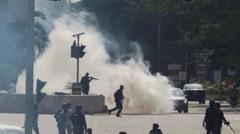How Did a Wrexham Winger Learn to Make Petrol Bombs at Just 11?

Published: 2025-10-20 12:00:23 | Category: wales
In a candid revelation, footballer James McClean has opened up about his tumultuous upbringing in the Creggan estate of Londonderry, where he learned to make petrol bombs and engage in rioting from a young age. His reflections not only underscore his challenging past but also highlight the deep-rooted complexities surrounding identity and political statements within sport.
Last updated: 30 October 2023 (BST)
Key Takeaways
- McClean learned to make petrol bombs as a child, indicating the violent environment of his youth.
- He faced death threats after refusing to wear a poppy, which symbolises remembrance for UK soldiers.
- The footballer connects his decision to not wear a poppy to the traumatic history of Bloody Sunday.
- His journey includes struggles with public perception and personal identity, exacerbated by mental health challenges.
- McClean remains dedicated to his roots, despite the backlash he faces for his beliefs.
Growing Up in Creggan: A Harrowing Childhood
James McClean's upbringing in Londonderry's Creggan estate was fraught with violence and turmoil. From a young age, he was exposed to the realities of conflict, learning how to make petrol bombs by the time he was just eleven. The Creggan area, historically significant for its role in Northern Ireland's troubled past, was characterised by frequent riots and a sense of unrest. McClean's experience reflects the generational impacts of political strife in the region.
The Impact of Political Conflict
The violence in Creggan was not merely a backdrop but a defining aspect of McClean's childhood. He described how rioting was a regular occurrence, with young people often caught up in the chaos. This environment had lasting effects on his perception of safety and community. McClean’s recollections are a stark reminder of how political conflict can influence the lives of those who grow up in its shadow.
Refusing to Wear the Poppy
Throughout his football career, McClean has consistently refused to wear a poppy during matches, a decision that has sparked significant controversy. The poppy is widely recognised as a symbol of remembrance for those who lost their lives in the World Wars. However, for McClean, it represents a broader history that includes the conflicts involving the UK military in Northern Ireland, particularly the events of Bloody Sunday.
Understanding the Significance of Bloody Sunday
On 30 January 1972, known as Bloody Sunday, 13 unarmed civil rights protestors were killed by British soldiers in Derry. This tragic event is pivotal in McClean's decision not to wear a poppy. He stated, “Six or seven people from the Creggan estate died on Bloody Sunday that day,” highlighting the personal connection he has to this historical moment. For McClean, wearing a poppy would feel like a betrayal to those who suffered as a result of such violence.
The Backlash and Its Effects
McClean's refusal to wear the poppy has led to significant backlash, including death threats and public vilification. He recounted instances of receiving bullets in the post and threats to his life during international matches. This pressure extended to his family, particularly his wife, Erin, who often felt anxious about his safety during these turbulent times.
Resilience in the Face of Adversity
Despite the challenges, McClean has remained steadfast in his beliefs. He remarked on how easy it would have been to conform and wear the poppy, but he chose to stay true to himself. His commitment to his roots and personal convictions has often overshadowed his achievements on the pitch, including earning over 100 caps for the Republic of Ireland.
Personal Struggles and Mental Health
In addition to the external pressures of public scrutiny, McClean has faced personal challenges. Earlier this year, he experienced a car crash that he described as a "wake-up call." This incident prompted him to reflect on his life and choices, further compounded by a diagnosis of autism at the age of 34. He expressed that understanding his condition has provided him with insights into his behaviour and reactions to stress.
Lessons Learned and Moving Forward
McClean’s journey illustrates the profound impact of upbringing, societal expectations, and personal identity. He acknowledges that while he is recognised for his refusal to wear a poppy, he has also achieved significant milestones in his career. The duality of being both a successful athlete and a figure of controversy speaks to the complexities faced by many individuals navigating their identities within the public sphere.
Conclusion: A Legacy Beyond Football
James McClean’s story is not just about football; it is a narrative woven with themes of identity, resistance, and resilience. His experiences highlight the profound ways in which personal history can shape public perception and individual choices. As McClean continues his journey, he remains a symbol of how one can remain committed to their beliefs despite societal pressures. The question remains: how will his legacy be defined in the broader context of sport and politics?
#JamesMcClean #Football #BloodySunday
FAQs
Why did James McClean refuse to wear a poppy?
James McClean refused to wear a poppy because he feels it represents all UK military conflicts, including those in Northern Ireland, which is a painful part of his heritage.
What is Bloody Sunday, and why is it significant to McClean?
Bloody Sunday refers to the events of 30 January 1972, when British soldiers shot and killed 13 unarmed civil rights protestors in Derry. This event deeply impacted McClean's views and his decision regarding the poppy.
How has McClean's refusal to wear a poppy affected him personally?
McClean has faced significant backlash, including death threats and public criticism, which have also caused distress to his family, particularly his wife.
What challenges has McClean faced in his personal life?
He has dealt with public scrutiny, mental health issues, and a recent car accident that he described as a wake-up call for reflection on his life and choices.
What does McClean say about his achievements in football?
Despite earning over 100 international caps, McClean feels that he is often overshadowed by his refusal to wear a poppy, which defines public perception of him more than his football accomplishments.



